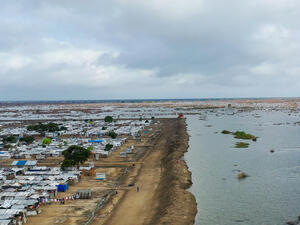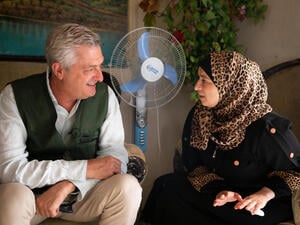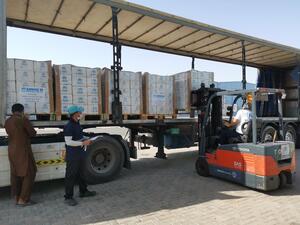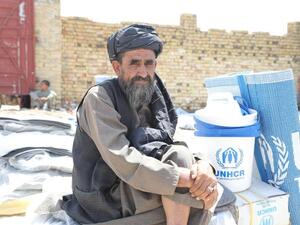Pakistan: food and shelter for Afghans at Chaman
Pakistan: food and shelter for Afghans at Chaman
UNHCR on Monday began distributing WFP food rations to the more than 25,000 Afghan refugees encamped at the southern Pakistani border town of Chaman, following an agreement with the Pakistani authorities. The vast majority of the Afghans have been stuck there since late February, when the government refused to permit any new refugees to enter UNHCR's adjacent Killi Faizo transit site. A nutrition survey in early May found an alarming rate of malnutrition among children stuck at the Chaman site.
Under an agreement with the authorities, each person will receive a 10-day WFP ration, including wheat flour, pulses and vegetable oil, along with rice contributed by Libya and Malaysia. UNHCR will also distribute a plastic tarpaulin to each family to cover their makeshift shelters so they can be better shielded from the sun. Once this distribution is completed and we have a better idea of how many Afghans are at the site, we plan to distribute a full month's food ration.
Conditions at Chaman's makeshift site have been extremely difficult for months, though we have made several improvements. Water was in extremely short supply until six new tanks were built, and now people at the Chaman makeshift site receive at least 12 litres a day. UNHCR's NGO partners have built 300 latrines, with another 100 under construction, and basic health care is also available. We have repeatedly requested to move these Afghans to one of our eight assisted camps in the nearby region, but so far the Pakistani authorities have refused.
Meanwhile refugee returns from Pakistan to Afghanistan continue, with more than 942,000 Afghans back home since the Afghanistan Interim Authority / UNHCR assisted return programme got underway on March 1. We've seen more than 864,000 people return from Pakistan, while more than 68,000 have come back from Iran and more than 9,000 have so far returned from the Central Asian states. UNHCR's funding situation remains fragile. We have so far received $180 million out of the $271 million that we require to handle the repatriation movement, the pace of which exceeded all expectations. With our funds due to run out by the end of this month, the financial situation is becoming dire.









